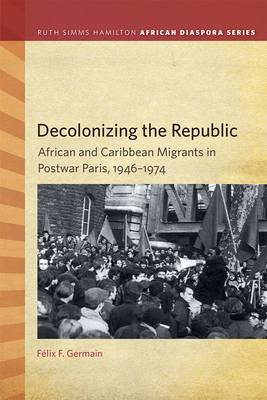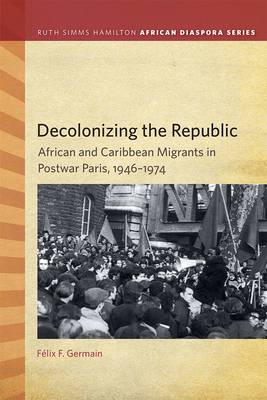
Door een staking bij bpost kan je online bestelling op dit moment iets langer onderweg zijn dan voorzien. Dringend iets nodig? Onze winkels ontvangen jou met open armen!
- Afhalen na 1 uur in een winkel met voorraad
- Gratis thuislevering in België vanaf € 30
- Ruim aanbod met 7 miljoen producten
Door een staking bij bpost kan je online bestelling op dit moment iets langer onderweg zijn dan voorzien. Dringend iets nodig? Onze winkels ontvangen jou met open armen!
- Afhalen na 1 uur in een winkel met voorraad
- Gratis thuislevering in België vanaf € 30
- Ruim aanbod met 7 miljoen producten
Zoeken
Decolonizing the Republic
African and Caribbean Migrants in Postwar Paris, 1946-1974
Félix F Germain
€ 51,95
+ 103 punten
Omschrijving
Decolonizing the Republic is a conscientious discussion of the African diaspora in Paris in the post-World War II period. This book is the first to examine the intersection of black activism and the migration of Caribbeans and Africans to Paris during this era and, as Patrick Manning notes in the foreword, successfully shows how "black Parisians--in their daily labors, weekend celebrations, and periodic protests--opened the way to 'decolonizing the Republic, ' advancing the respect for their rights as citizens." Contrasted to earlier works focusing on the black intellectual elite, Decolonizing the Republic maps the formation of a working-class black France. Readers will better comprehend how those peoples of African descent who settled in France and fought to improve their socioeconomic conditions changed the French perception of Caribbean and African identity, laying the foundation for contemporary black activists to deploy a new politics of social inclusion across the demographics of race, class, gender, and nationality. This book complicates conventional understandings of decolonization, and in doing so opens a new and much-needed chapter in the history of the black Atlantic.
Specificaties
Betrokkenen
- Auteur(s):
- Uitgeverij:
Inhoud
- Aantal bladzijden:
- 256
- Taal:
- Engels
- Reeks:
Eigenschappen
- Productcode (EAN):
- 9781611862041
- Verschijningsdatum:
- 1/07/2016
- Uitvoering:
- Paperback
- Formaat:
- Trade paperback (VS)
- Afmetingen:
- 150 mm x 224 mm
- Gewicht:
- 408 g

Alleen bij Standaard Boekhandel
+ 103 punten op je klantenkaart van Standaard Boekhandel
Beoordelingen
We publiceren alleen reviews die voldoen aan de voorwaarden voor reviews. Bekijk onze voorwaarden voor reviews.











